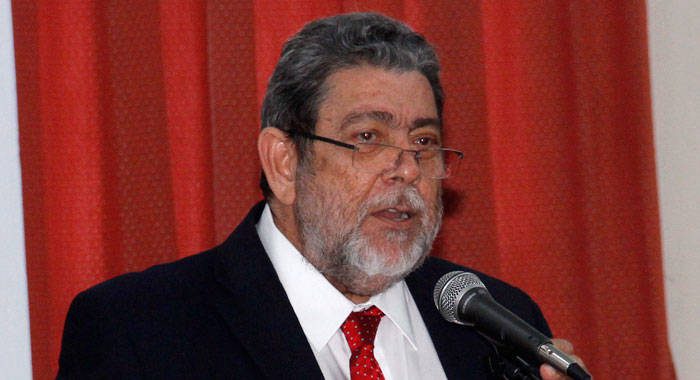Prime Minister Ralph Gonsalves last week, for yet another time, used the proposed revised constitution that Vincentians rejected a decade ago to bash the opposition over the absence of integrity legislation in St. Vincent and the Grenadines.
Integrity legislation was a central plank of the campaign that brought Gonsalves’ Unity Labour Party to office in March 2001.
During that campaign, Sir Vincent Beache had promised integrity legislation within the first 100 days of a ULP administration.
However, 6,309 days later, the country is still without integrity legislation.
During last week’s meeting of Parliament, Arnhim Eustace, Member for East Kingstown, asked Minister of Finance, Economic Planning, Sustainable Development and Information Technology, Camillo Gonsalves if the Unity Labour Party administration is contemplating the establishment of integrity legislation “as in the case of so many other countries to monitor the assets and liabilities of members of parliament; and if in the affirmative when can such legislation be expected”.
The finance minister deferred the question to the prime minister who is Minister of Legal Affairs because the question “refers to criminal sanctions”.
The prime minister told Parliament that he is “always amused when members of the opposition call for integrity legislation when they had an opportunity in November 2011 to support constitutional reform which had as one of its centrepieces, the establishment of a full-fledged integrity commission with constitutional protection”.
In that referendum, the main opposition New Democratic Party, under Eustace’s leadership persuaded voters to reject the proposed changes to the constitution in a vote that political observers say was a referendum on the stewardship of the ULP administration.
If the referendum were general elections, the ULP administration would have been voted out of office 13 seats to 2.
Gonsalves told Parliament last week that the proposed changes to the constitution was far superior to what exists now.
“And there were no down sides from a democratic standpoint, standpoint of transparency, standpoint of independence, judiciary, protection of individual rights and freedoms, reduction in the powers of the prime minister and the like. An opportunistic political position was taken.”
He noted that Member of Parliament for Central Kingstown, St. Clair Leacock, an opposition lawmaker, had said it was a good constitution but he had to follow the party line.
Gonsalves further said that the chair of the NDP at the time, Linton Lewis, has subsequently said that the proposed reformed constitution was far superior to what exists.
The prime minister said that was also the view of every dispassionate person who has examined the rejected constitution.
He, however, said that ever so often he hears the opposition speak on the platform about integrity legislation.
“Clearly, in 2009, the NDP didn’t consider this to be such an important matter, because if it did, they would have campaigned for the constitutional reform process.”
Gonsalves said that the impression is often given that nothing exists to deal with issues that “integrity legislation” would address.
“There is not a blank slate at the moment,” Gonsalves said, adding that the criminal court outlines offences and sanctions.
“And when you go past those specific sections, if you steal in the Public Service or if you obtain anything by deception, property or pecuniary advantage, you can be charged under the Criminal Code as many persons have indeed been charged under the criminal code in this country over the years. Indeed, Mr. Speaker, public servants have been so charged and politicians — at least one.”
He said there is also a common law offence of misbehaviour in public office “where you can have particulars under misbehaviour in public office for different kinds of behaviour by public servants, by parliamentarians, ministers and the like, and that carries a penal sanction.”
Gonsalves, however, said that having said that, he has been in discussion in CARICOM and the OECS and would like to see fashioned, particularly in the OECS, “a model piece of legislation regionally to address matters in relation to quote-unquote integrity legislation.
“So, I restate the position that the opposition is not serious on this issue,” the prime minister said.







More gobbledegook from a Prime Minister who has mastered the art of obfuscation:
1. The citizens of SVG — not just the opposition NDP — rejected the 2011 constitution not because they opposed the integrity legislation but on other grounds (such as moving from a constitutional monarchy to a republic).
2. If we have alwasy had sufficient legislation to punish political corruption and related crimes, why did the ULP feel obliged to include a robust system of accountability and transparency section in the 2011 constitution?
3. Why has this government failed to enact the Freedom of Information Act approved by parliament in 2003, legislation which would allow for transparency and accountability in government operation as part of the larger issue of the integrity of the entire government apparatus including its elected and appointed members? More particularly, what is this government trying to hide from the people?
Failure to enact appropriate legislation in these areas is both necessary and sufficient grounds for removing this government in the next election subject to an iron-clad, legally-binding agreement — if this is possible — by the opposition to resign if they do not do so within their first 100 days in office.
Yeah, i like that comment. Well said.
Very nicely put Mr C.ben, you are quite right. I just thank heavens that the ULP was unsuccessful in passing the new referendum into law. Had they succeeded we would have had a fully fledged Maduro style dictatorship in place by now. If you look at the tyranny we have had to endure without a new constitution, can anyone just imagine what a mess we would be in now with that new Marxist constitution.
This is good reporting Mr. Chance. Congrats! Remember that you are the eyes and ears of the people. Stay objective.
The Vincentian 22.3.96.” DECLARE ASSETS NOW!”ULP historic bill to parliament on the 28.3.96 while in opposition.